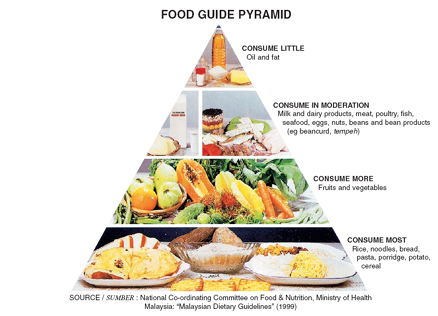Many parents worry about whether they’re feeding their child too little; too much; or the wrong types of foods. Combine that with children who won’t sit still long enough to eat, insist on eating the same thing every day and won’t try new foods, and it’s easy to understand why parents find it difficult to feed their children a healthful diet.
Meal-Planning Aid
The easiest way to gauge how much to feed your child is to refer to the Food Guide Pyramid for children (see picture).

Feeding him too much or too little from each food group can be harmful, because each type of food has different roles in your child’s nutrition.
Carbohydrates
Your body breaks down the carbohydrates you eat into glucose, which is your body’s “fuel”. Too few carbohydrates in your child’s daily diet may result in her being sluggish or lacking energy to go about her daily activities. Too much will cause the body to store the extra energy as fat in her body, and will eventually lead to obesity.
Protein
The body uses energy from protein as the basic materials for growth. The right amount of protein is essential for a young child’s growth, not just to ensure that she grows as tall as she can, but that she has sufficient muscle mass for all the busy, fun activities of childhood. Excess protein in the diet will also be converted to fat and be stored in the body, so feed your child just as much as she needs.
Fats
Like carbohydrates, fats provide energy for everyday activities. They also help regulate body temperature and have a part in hormone and cell production. This is the role that fat stored in the body plays. Fats are also important for brain development, eg docosahexaenoic acid (DHA), eicosapentaenoic acid (EPA) and arachidonic acid (ARA) which are derived from the essential fatty acids, namely lienoleic and linolenic acids.
Vitamins A, D, E and K are categorised as fatsoluble vitamins, therefore the only way to ensure your body absorbs these nutrients is by taking foods that contain a certain amount of fat. Studies show that a daily diet which contains less than 15% of total energy from fat might have a tendency of not getting enough fat-soluble vitamins.
Vitamins & Minerals
Vitamins are organic chemicals that the body needs tiny amounts of in order to function properly, but cannot manufacture on its own. Each vitamin has a different role. Part of the reason for eating a balanced diet is that vitamins are present in varying amounts in different foods, therefore eating a more varied diet over time ensures that enough vitamins are consumed.
- Vitamin A is found in liver, dairy products, dark-coloured fruits and leafy vegetables
- Vitamin B is found in grains, cereals, liver and other organ meats, egg yolk and dairy products
- Vitamin C is found in most raw fruits and vegetables
- Vitamin D can be found in most types of fish and in egg yolk, but is also derived from other chemicals already present in the body when a person is exposed to sunlight. Five to ten minutes of sun exposure per day (with sunblock lotion) is therefore important to ensure sufficient Vitamin D.
- Vitamin E is found in vegetable oils and nuts
- Vitamin K is found in dark green, leafy vegetables
Dietary minerals are elements that the body needs in order to remain in good health. A balanced diet of different types of vegetables, meats, grains and dairy products is usually enough to ensure that a child gets all the minerals he needs.







Comments